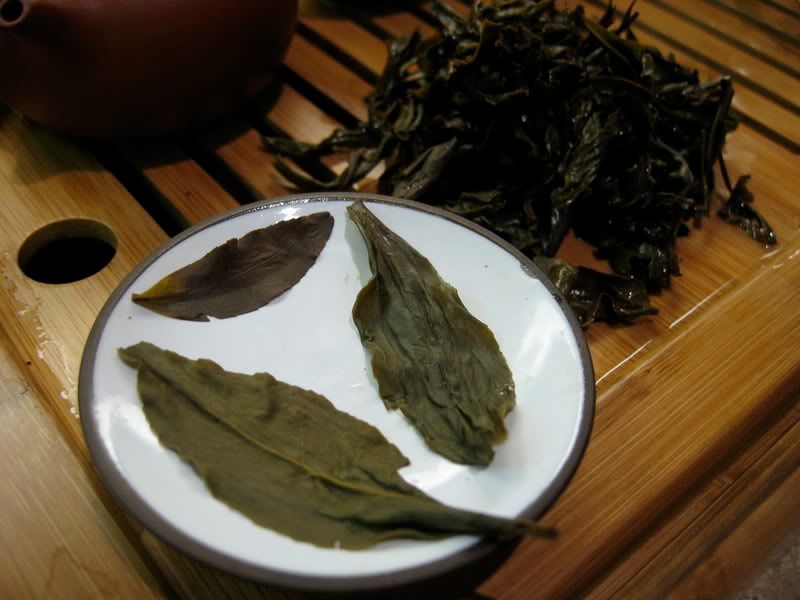Origin: Wuyi Mountain, Fujian Province, China
Year: 2006
Vendor: Jing Tea Shop
Price: Part of the "Most Wanted Wuyi Oolong Teas" tasting set, priced at $19.00 (25g of four teas)
Verdict: 7.5/10
The name "Rou Gui" carries a lot of baggage. Before I tried Rou Gui, I heard about its "amazing cinnamon aroma and flavor" a countless number of times. When I ordered my first sample, I nearly expected to open the package to find a piece of cassia bark chopped up into little tea leaf shapes.
Let me be blunt: don't trust the hype.
I realize that there may be other batches of Rou Gui that taste and smell more like cinnamon/cassia (As I understand it, the name "Rou Gui" implies such a characteristic), but I think it is an over-generalization to assume all Rou Gui is chock full of cinnamon goodness. As a result of this association, my palate wants to find a touch of cinnamon/cassia in Rou Gui, even though I don't really perceive any. This is unfortunate, but my best advice is that the next time you brew yourself some Rou Gui, try to think "tea," not "cinnamon."
Now that my rant is over, here's the review:
 Dry Leaf:
Dry Leaf:Nice, long, wiry leaves. They are quite a bit greener than the leaves of the other Wuyi yancha I have reviewed. These leaves give off an above average aroma— rich, creamy, and kissed with tropical fruit (kiwi, I think). This strange kiwi-esque aroma/flavor managed to baffle me throughout the tasting session, and I still don't feel like I have it pinned down. In any case, it's a nice fragrance, and the fact that I can't identify it only makes it more enjoyable.
Parameters:
4.6g leaf; 90mL yixing pot; 195°F tap water; rinse, 30s, 36s, 41s, 44s, 48s, 51s, 55s
***Note: Because my yixing teapots take a significantly long time to decant their liquid relative to the total infusion time, infusion times include the approximate 10-12s pour.***
 Liquor:
Liquor:This was a pleasant, though slightly elusive, tea to drink. There was essentially no fire or charcoal taste (which played well with the other flavors), and a slight astringency throughout the session, which was just enough to brighten the tea without getting in the way of its flavor. There was also a long, cooling hui gan that was nicely refreshing.
However, my greatest interest in this tea is the kiwi-esque flavor I alluded to earlier. It's like one removed the sugary sweetness from the fruit and replaced it with a hint honey and cream. Still... this description isn't perfect. I'm curious whether it can be compared to another taste I just haven't experienced, or if it is a novel flavor. On the downside, there was a fair amount of dust that made its way through the filter and into the cup, and the liquor consistently had a thin mouth feel. Nevertheless, this tea's mystery managed to hold my attention (which is not an easy feat, I might add), and earned it high marks in my book.
 Wet Leaf:
Wet Leaf:Believe it or not, this picture is pretty much representative of the wet leaves. Usually I try to pick out the best ones for these photos, but I picked these out right away and just kept finding similarly large and whole leaves. Inevitably there were a few broken ones here and there, but it really seems like a good amount of effort was put into producing this tea.
Conclusion:
This was a much better tea (in my opinion, of course) than the Seasonal Shui Xian I recently reviewed. There was a pleasant lack of charcoal, and a novel yet balanced flavor. Most importantly, this tea demanded my attention and required me to really concentrate. Still, mystery alone does not a great tea make. While this seasonal Rou Gui had good balanced flavor, it wasn't out of this world. With these things taken into consideration, I give this tea a 7.5/10.


Rou Gui has become one of my favorites. After having ordered some from several different vendors now, one thing I can definitively say is that the cassia bark aroma varies GREATLY between batches/vendors. Some have a very permeating and noticeable spicy cinnamon/cassia aroma, others are much more of a traditional Wuyi with interesting complexities. Age also changes this. If you want one with a strong cassia aroma and taste, you might try getting some from teacuppa.com. I think it's worth it. One thing I've noted, though, is that to ME, the aroma is more like cherry pipe tobacco than cinnamon, but it definitely is spicy.
ReplyDelete